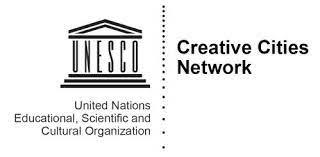Full Text Sharing

Creative Cities | Creative Cities Network (unesco.org)
What is the Creative Cities Network ?
The UNESCO Creative Cities Network (UCCN) was created in 2004 to promote cooperation with and among cities that have identified creativity as a strategic factor for sustainable urban development. The 246 cities which currently make up this network work together towards a common objective: placing creativity and cultural industries at the heart of their development plans at the local level and cooperating actively at the international level.
By joining the Network, cities commit to sharing their best practices and developing partnerships involving the public and private sectors as well as civil society in order to:
- strengthen the creation, production, distribution and dissemination of cultural activities, goods and services;
- develop hubs of creativity and innovation and broaden opportunities for creators and professionals in the cultural sector;
- improve access to and participation in cultural life, in particular for marginalized or vulnerable groups and individuals;
- fully integrate culture and creativity into sustainable development plans.
The Network covers seven creative fields: Crafts and Folk Arts, Media Arts, Film, Design, Gastronomy, Literature and Music.
The Creative Cities Network is a privileged partner of UNESCO, not only as a platform for reflection on the role of creativity as a lever for sustainable development but also as a breeding ground of action and innovation, notably for the implementation of the 2030 Agenda for Sustainable Development.
Objectives The UNESCO Creative Cities Network aims to:
strengthen international cooperation between cities that have recognized creativity as a strategic factor of their sustainable development; stimulate and enhance initiatives led by member cities to make creativity an essential component of urban development, notably through partnerships involving the public and private sectors and civil society.
strengthen the creation, production, distribution and dissemination of cultural activities, goods and services;
develop hubs of creativity and innovation and broaden opportunities for creators and professionals in the cultural sector;
improve access to and participation in cultural life as well as the enjoyment of cultural goods and services, notably for marginalized or vulnerable groups and individuals; fully integrate culture and creativity into local development strategies and plans.










Add new comment